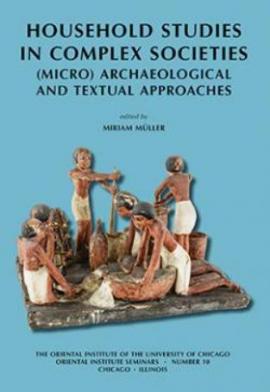The Oriental Institute of the University of Chicago announces the in print and online publication of a new title:
OIS 10. Household Studies in Complex Societies: (Micro) Archaeological and Textual Approaches
Edited by Miriam Müller
With contributions by Felix Arnold, Heather D. Baker, Aaron J. Brody, Paolo Brusasco, Jens-Arne Dickmann, Aren M. Maeir, Peter A. Miglus, Nadine Moeller, Brian P. Muhs, Miriam Müller, Lisa C. Nevett, Adelheid Otto, Peter Pfälzner, Nicholas Picardo, Lynn Rainville, Cynthia Robin, Kate Spence, Neal Spencer, Elizabeth C. Stone, and Tasha Vorderstrasse
Oriental Institute Seminars 10
Chicago: The Oriental Institute, 2015
ISBN 978-1-61491-023-7
Pp. xlii + 470; 208 illustrations
$25.95 (in print book sold and distributed by Casemate Academic http://www.oxbowbooks.com/dbbc/ )
The volume is the result of the Ninth Annual University of Chicago Oriental Institute PostDoc Seminar, held on March 16-17, 2013. Twenty scholars specialized in the Old and New World from all over Europe and the US came together to find new approaches in the study of households in complex societies. The papers in this volume present case studies from the Near East, Egypt and Nubia, the Classical World, and Mesoamerica, including three comparative responses from the perspective of the different disciplines. By combining the archaeology record, scientific data and written documents the papers examine and contextualize different approaches and techniques in uncovering household behavior from the material record and discuss their suitability for the respective region and site. Building on the methodological groundwork laid out in a number of recent publications on household archaeology the volume contributes to the methodological and theoretical discussion, expands on the topics of society, identity, and ethnicity in household studies and opens up new avenues of research such as the perception of space in this innovative field.
At the same time the papers reveal problems and disparities with which household archaeology is still struggling. It is hoped that the variety of case studies presented in this volume will further inspire the interested reader to establish new research agendas and excavation strategies that contribute to the development of the field in the various regions covered in the different papers and beyond.
Table of Contents
“Introduction: Household Studies in Complex Societies: (Micro) Archaeological and Textual Approaches.” Miriam Müller, The Oriental Institute
PART I: Method and Theory
1. “Investigating Traces of Everyday Life in Ancient Households: Some Methodological Considerations.” Lynn Rainville, Sweet Briar College
2. “Activity-area Analysis: A Comprehensive Theoretical Model.” Peter Pfälzner, University of Tübingen
3. “How to Reconstruct Daily Life in a Near Eastern Settlement: Possibilities and Constraints of a Combined Archaeological, Historical, and Scientific Approach.” Adelheid Otto, Johannes Gutenberg-Universität Mainz
4. “Ancient Egyptian Houses and Households: Architecture, Artifacts, Conceptualization, and Interpretation.” Kate Spence, University of Cambridge
5. “Artifact Assemblages in Classical Greek Domestic Contexts: Toward a New Approach.” Lisa C. Nevett, University of Michigan
PART II: Perception of Space
6. “Interaction between Texts and Social Space in Mesopotamian Houses: A Movement and Sensory Approach.” Paolo Brusasco, University of Genova
7. “Clean and Unclean Space: Domestic Waste Management at Elephantine.” Felix Arnold, German Archaeological Institute, Cairo
8. “Creating a Neighborhood within a Changing Town: Household and Other Agencies at Amara West in Nubia.” Neal Spencer, British Museum
9. “Crucial Contexts: A Closer Reading of the Household of the Casa del Menandro at Pompeii.” Jens-Arne Dickmann, University of Freiburg
PART III: Identity and Ethnicity
10. “Private House or Temple? Decoding Patterns of the Old Babylonian Architecture.” Peter A. Miglus, University of Heidelberg
11. “Hybrid Households: Institutional Affiliations and Household Identity in the Town of Wah-sut (South Abydos).” Nicholas Picardo, The Giza Project, Harvard University
12. “Living in Households, Constructing Identities: Ethnicity, Boundaries, and Empire in Iron
Ii Tell en-Nasbeh.” Aaron J. Brody, Pacific School of Religion
13. “Micro-archaeological Perspectives on the Philistine Household throughout the Iron Age and Their Implications.” Aren M. Maeir, Bar-Ilan University
PART IV: Society
14. “Property Title, Domestic Architecture, and Household Lifecycles in Egypt.” Brian P. Muhs, The Oriental Institute
15. “Late Middle Kingdom Society in a Neighborhood of Tell el-Dabʿa/Avaris.” Miriam Müller, The Oriental Institute
16. “Family Structure, Household Cycle, and the Social Use of Domestic Space in Urban Babylonia.” Heather D. Baker, University of Vienna
17. “Reconstructing Houses and Archives in Early Islamic Jēme.” Tasha Vorderstrasse, The Oriental Institute
PART V: Responses
18. “Social Conditions in the Ancient Near East: Houses and Households in Perspective.” Elizabeth C. Stone, State University of New York
19. “Multifunctionality and Hybrid Households: The Case of Ancient Egypt.” Nadine Moeller, The Oriental Institute
20. “A Mesoamerican Perspective on Old World Household Studies in Complex Societies.” Cynthia Robin, Northwestern University


